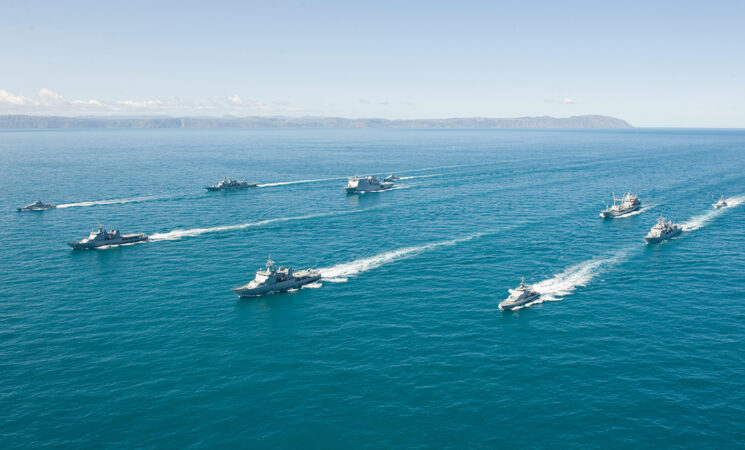27 March 2022, NIICE Commentary 8600
Kriti Chopra
The recent joint drills conducted by Russia, China, and Iran in the Gulf of Oman in March 2023 have sparked considerable debate on the subject of strengthening ties between these countries. Beijing sent the guided missile destroyer Nanning to take part in the maneuvers, which focused on search and rescue at sea and other non-combat missions. In the month of December 2019, the navy conducted a maneuver of a similar nature. This action comes at a time when economic relations between China and the United States are at an all-time low. On the other hand, the United States appears to be brushing off the drills as nothing more than a routine training exercise, which does not frighten them. But is it really that straightforward? Is the dominance of the West in jeopardy?
China, Iran, and Russia are joining forces to strengthen their defence, strategic, and economic ties. It does not take much to deduce this from recent events. Since Russia’s invasion of Ukraine, the two countries have grown closer. China is uneasy about the war, but it still provides Russia with diplomatic cover through economic support. China has rejected the G-7’s (Group of Seven) oil price caps. The same can be said for Iran, which continues to buy Russian oil and has even signed a primary agreement for energy cooperation. Iran has also sent a swarm of ‘Kamikaze’ drones to Russia to aid in the battle. According to recent reports, Iran is also on track to send ballistic missiles to Russia by October. The leaders of the two countries are often seen flying to each other’s capitals, which shows that these ties are getting stronger.
Russian President Vladimir Putin paid a visit to Tehran in July, where he met with his counterpart and discussed ways to strengthen ties. Russian security officials visited Iran in November of last year, while the conflict was still ongoing, to discuss how to deal with western pressure during the Ukraine War. The same thing is happening in China, where Russia is still a friend and both countries see themselves as friends. China’s relationship with Iran appears to be blossoming as well. China and Iran signed a 25-year strategic agreement in 2021. This agreement demonstrates China’s strong presence in Iran. Iran, on the other hand, believes it is still a game of give and take. Iran is now a permanent member of the SCO (Shanghai Cooperation Organisation) as a result of the agreement. Membership helps Iran overcome economic isolation, and it helps Russia and China deal with their main adversary, the United States.
Ebrahim Raisi, the president of Iran, traveled to China in February and was greeted with a hero’s welcome by the Chinese government. This is also the first visit to China by an Iranian president in the last two decades. In an editorial that was published in the Global Times, the visit was seen as a step towards the formation of an anti-Western coalition. Do these comments and occurrences point to the formation of an anti-Western alliance? Does this point to the establishment of a new world order? It would appear so, especially considering how the mainstream media in the United States has been fixated on this theory as of late. The western media is of the opinion that an anti-West alliance is inevitable, and smaller countries like Venezuela, Cambodia, Myanmar, Nicaragua, and North Korea support this vision as well. This makes it clear that Russia, Iran, and China are gathering support from all like-minded nations to take on the western enemy.
Is it reasonable to be concerned about India in light of all this? Is this new world order something that India should be concerned about? To be honest, no. Throughout all of these years, Russia and India have kept their relations on an exceptionally friendly level, and it appears that India and Iran are also on a firm footing. The sole bad apple is China, but despite the fact that India and China may not get along very well, China is not going to take any steps that would turn India into an enemy of China. Russia and Iran will never align themselves against India. It is inconceivable that these two countries would join forces against India, and in any case, the alliance in question has nothing to do with India at all. It is about the Western world, its monopoly, its supremacy, its blatant lectures, and its self-centered wars. It’s possible that China, Iran, and Russia each have specific grievances with the United States, but the idea still has a chance of finding supporters for the simple reason that countries are sick of the West treating the rest of the globe like their own playground. Going to war at whim, imposing sanctions at whim, and giving sermons to other people at whim are all examples of this. Their reputation as a superpower may have been diminished, but their sense of entitlement has not changed. This overwhelming feeling of entrapment is precisely what has brought together their opponents.
Kriti Chopra is a Senior Research Affiliate at the Centre for East Asian Studies at Christ University, India and was awarded the ICSSR Fellowship for her research.

